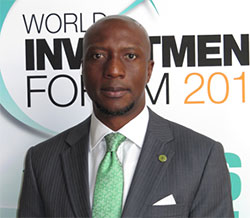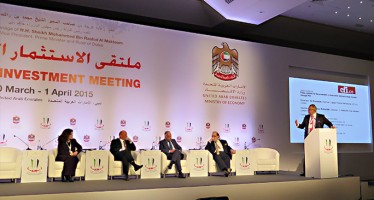Nigerian Stock Exchange: Corporate Governance to Reign Supreme

CEO: Oscar Onyema
The buoyant Nigerian Stock Exchange (NSE), with well over two hundred listed securities representing a total market capitalisation in excess of $80bn (equities), is set to become the destination of choice for both investors and companies looking to raise capital, and their profile, in Africa. As recently as May of 2013, the NSE led African exchanges with a year-on-year dollar-adjusted return of 70.5% on its benchmark NSE-30 Index. Though the bull-run has tapered off slightly this year, mostly as a result of early profit taking, market watchers expect the pace to pick up shortly.
Interest from both domestic and overseas investors in trading on the NSE remains strong. The recent rebasing of the Nigerian economy – which raised the country’s GDP from $269bn to $509bn overnight – has kindled interest further, says NSE Chief Executive Officer Oscar Onyema. “The rebasing just validated what lots of people already knew; namely that the Nigerian economy is the most robust of the continent and also boasts the largest growth potential. A much bigger surprise the rebasing produced is the fact that the services industry now accounts for fully half of Nigeria’s national income.”
Mr Onyema also noted that the rebasing of the economy greatly facilitates the setting of effective policies and the construction of regulatory frameworks: “We now have a much better idea not just about the size of the economy, but also about its composition.”
“The NSE is already an excellent platform for creating durable wealth and will now expand on that value proposition and scale it across Africa.”
– Oscar Onyema
Mr Onyema stresses that Nigeria has become an increasingly attractive market for foreign direct investment (FDI) and portfolio investment (FPI) alike. “We are a thoroughly modern exchange equipped with state-of-the-art technology and operating in a truly open market. About 60% of the trading activity made through the NSE come from overseas. Foreign investors like our liquid market and face no restrictions on the repatriation of funds through the banking system as long as they came in through the certificate of capital importation process. Nigeria has no capital gains tax and only a 10% withholding tax (dividends).”
Competitive Edge
The NSE currently offers three trading platforms: equities, fixed income, and exchange traded funds. Two additional platforms – an options and futures market – are currently being developed and will be rolled out over the next few years enabling investors to better hedge risk. “We aim to be at least as competitive as other international capital markets. The NSE is already an excellent platform for creating durable wealth and will now expand on that value proposition and scale it across Africa,” said Mr Onyema.
The exchange’s CEO emphasised that Nigeria is a fiercely competitive market. “Nigerians are smart and highly intelligent businesspeople. During my travels in Africa I am told time and again that Nigerians pursue their business objectives in a very proactive manner that some may even call aggressive. If you come into this market and manage to survive by engaging on an equal footing with local partners, you are definitely set to make it across the continent.”
Mr Onyema added that most foreign investors enter the Nigerian market with the full intention of making it big: “Usually, the minimum expectation is a return of thirty percent or more. This goes for both FDI and portfolio investment. That’s a pretty big number and helps explain why so many large global companies, such as GE and Cargill, are now moving decisively into Nigeria. Meanwhile, the Chinese are also all over the place, making for a very dynamic environment in which opportunities abound and optimism prevails.”
Stock Exchanges and Sustainability
This week Mr Onyema visited Geneva to attend the World Investment Forum (WIF) organised by the United Nations Conference on Trade and Development (UNCTAD). One of the main WIF events was the fourth Global Dialogue on the Sustainable Stock Exchanges (SSE) Initiative which the Nigerian Stock Exchange signed onto last year.
The initiative aims to promote sustainable business practices that include environmental, social, and corporate governance (ESG) parameters. “We signed on to the SSE Initiative as we were developing our own corporate social responsibility programme and quickly realised that we needed to go beyond the exchange and find benchmarks against which to measure our performance. The SSE Initiative provides us an opportunity to imbibe best practices and to better understand the opportunities and challenges that exchanges across the world face as they try to include sustainability into the way they engage with the investor community and the listed companies.”
In his presentation on Tuesday at the United Nations, Mr Onyema explained that the NSE is fully committed to furthering corporate governance best practices amongst its listed companies. The exchange is now developing a number of initiatives and frameworks that seek to place governance on an equal footing with other parameters of corporate performance. “Listening to what other exchanges had to say about sustainability made it even clearer that we have to move at a swift pace if we are to meet and finance the Sustainable Development Goals (SDGs) that will be set in September 2015, otherwise we’ll be back in 2030 saying that little was accomplished.”
Mr Onyema is aware that finding sustainable ways of financing the SDGs must remain a priority for exchanges. The Global Dialogue in Geneva also underscored the fact that each jurisdiction requires a tailor-made approach to sustainability. “Each exchange finds that it must grapple with unique challenges and circumstances. No two jurisdictions are quite alike. The one-size-fits-all philosophy is not really applicable when exchanges and wider eco-system in which they operate, may be at different levels of development, however, setting minimum sustainability reporting standards.”
Governance Reigns Supreme
At an early stage in the development of its sustainability programmes, the NSE opted to focus on the governance aspect. “That is not to say our exchange ignores the environmental and social dimensions; it is just that in our case governance is considered more important still. On November 3, the NSE is launching its corporate governance rating system which has been designed from the ground up to create awareness of governance best practices amongst the corporates listed on our exchange.”
Mr Onyema added that the rating system allows listed companies to see where they stand on governance issues in relation to their peers: “This also creates a clear path for companies to attain full compliance with global governance standards.”
The NSE’s new governance rating system is made up of four components: a self-assessment report, a probe into the fiduciary responsibilities of company directors, an opinion survey held amongst stakeholders, and an audit conducted by a panel of external assessors of high standing. “The last item is of particular importance. We want a group of older and widely respected people – pillars of our society with impeccable credentials – to audit the findings and certify them as truthful. This is essential if our governance rating is to have credibility. The same holds true for the opinion survey which will give all stakeholders – employees, suppliers, creditors, and many others – an opportunity to assess the company on its actual operational behaviour.”
Partnerships
Mr Onyema explained that the NSE governance rating system is being set up in partnership with the Nigerian Convention on Business Integrity and with assistance and guidance provided by the Humboldt-Viadrina School of Governance in Berlin. “For us it is very important that the NSE not only has credibility in Nigeria, but across the world. This is why we have asked international entities to rate and review our progress and to provide external assurances that when the NSE rates a company 70 out of a possible 100 for corporate governance this truly tells the whole story.”
The governance rating system to be launched in a few weeks is, however, but a first step. The NSE is also working on the launch of a governance index and the creation of a premium board which is to become the realm of companies that have scored exceptionally well on the governance rating system and also meet or exceed other stringent listing criteria. This premium board will be exclusive to companies with a market capitalisation of at least $1bn.
Mr Onyema revealed that pilot programmes have shown that companies which wholeheartedly embrace corporate governance best practices, and feature on the NSE premium board, may expect to outperform the overall market by as much as 300%. “This seems to offer proof that embedding governance best practices into a company’s day-to-day operations is a proposition that results in sizeable gains for all stakeholders.”
You may have an interest in also reading…
UNCDF: Bringing New Parties to the Table – Engaging the Private Sector to Drive Investment into Least Developed Countries
It is widely understood that the world is falling far short of the funding flows required to achieve the Sustainable
CFI.co Picked as Knowledge Partner for AIM 2016 for the Second Time
CFI.co Picked as Knowledge Partner for AIM 2016 for the Second Time, alongside Investment Consulting Associates (ICA) and UN ESCWA. The theme
Inflation, Used Cars, Silicon Chips and Supply-Demand: Links in a Worrying Chain
Chips — no, not the potato or chocolate kind, the electronic ones – are a driving force behind a spike


















































































